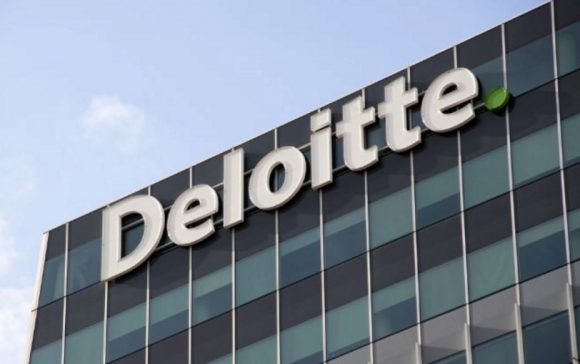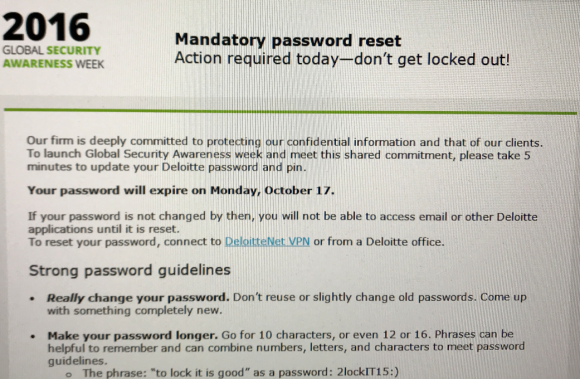Deloitte, one of the world’s “big four” accounting firms, has acknowledged a breach of its internal email systems, British news outlet The Guardian revealed today. Deloitte has sought to downplay the incident, saying it impacted “very few” clients. But according to a source close to the investigation, the breach dates back to at least the fall of 2016, and involves the compromise of all administrator accounts at the company as well as Deloitte’s entire internal email system.

In a story published Monday morning, The Guardian said a breach at Deloitte involved usernames, passwords and personal data on the accountancy’s top blue-chip clients.
“The Guardian understands Deloitte clients across all of these sectors had material in the company email system that was breached,” The Guardian’s Nick Hopkins wrote. “The companies include household names as well as US government departments. So far, six of Deloitte’s clients have been told their information was ‘impacted’ by the hack.”
In a statement sent to KrebsOnSecurity, Deloitte acknowledged a “cyber incident” involving unauthorized access to its email platform.
“The review of that platform is complete,” the statement reads. “Importantly, the review enabled us to understand precisely what information was at risk and what the hacker actually did and to determine that only very few clients were impacted [and] no disruption has occurred to client businesses, to Deloitte’s ability to continue to serve clients, or to consumers.”
However, information shared by a person with direct knowledge of the incident said the company in fact does not yet know precisely when the intrusion occurred, or for how long the hackers were inside of its systems.
This source, speaking on condition of anonymity, said the team investigating the breach focused their attention on a company office in Nashville known as the “Hermitage,” where the breach is thought to have begun.
The source confirmed The Guardian reporting that current estimates put the intrusion sometime in the fall of 2016, and added that investigators still are not certain that they have completely evicted the intruders from the network.
Indeed, it appears that Deloitte has known something was not right for some time. According to this source, the company sent out a “mandatory password reset” email on Oct. 13, 2016 to all Deloitte employees in the United States. The notice stating that employee passwords and personal identification numbers (PINs) needed to be changed by Oct. 17, 2016, and that employees that failed to do so would be unable to access email or other Deloitte applications. The message also included advice on how to pick complex passwords:

A screen shot of the mandatory password reset email Deloitte sent to all U.S. employees in Oct. 2016, around the time sources say the breach was first discovered.
The source told KrebsOnSecurity they were coming forward with information about the breach because, “I think it’s unfortunate how we have handled this and swept it under the rug. It wasn’t a small amount of emails like reported. They accessed the entire email database and all admin accounts. But we never notified our advisory clients or our cyber intel clients.”
“Cyber intel” refers to Deloitte’s Cyber Intelligence Centre, which provides 24/7 “business-focused operational security” to a number of big companies, including CSAA Insurance, FedEx, Invesco, and St. Joseph’s Healthcare System, among others.
This same source said forensic investigators identified several gigabytes of data being exfiltrated to a server in the United Kingdom. The source further said the hackers had free reign in the network for “a long time” and that the company still does not know exactly how much total data was taken.
In its statement about the incident, Deloitte said it responded by “implementing its comprehensive security protocol and initiating an intensive and thorough review which included mobilizing a team of cyber-security and confidentiality experts inside and outside of Deloitte.” Additionally, the company said it contacted governmental authorities immediately after it became aware of the incident, and that it contacted each of the “very few clients impacted.”
“Deloitte remains deeply committed to ensuring that its cyber-security defenses are best in class, to investing heavily in protecting confidential information and to continually reviewing and enhancing cyber security,” the statement concludes.
Deloitte has not yet responded to follow-up requests for comment. The Guardian reported that Deloitte notified six affected clients, but Deloitte has not said publicly yet when it notified those customers.
Deloitte has a significant cybersecurity consulting practice globally, wherein it advises many of its clients on how best to secure their systems and sensitive data from hackers. In 2012, Deloitte was ranked #1 globally in security consulting based on revenue.
Deloitte refers to one or more of Deloitte Touche Tohmatsu Limited, a private company based in the United Kingdom. According to the company’s Web site, Deloitte has more than 263,000 employees at member firms delivering services in audit and insurance, tax, consulting, financial advisory, risk advisory, and related services in more than 150 countries and territories. Revenues for the fiscal year 2017 were $38.8 billion.
The breach at the big-four accountancy comes on the heels of a massive breach at big-three consumer credit bureau Equifax. That incident involved several months of unauthorized access in which intruders stole Social Security numbers, birth dates, and addresses on 143 million Americans.
This is a developing story. Any updates will be posted as available, and noted with update timestamps.
from
https://krebsonsecurity.com/2017/09/source-deloitte-breach-affected-all-company-email-admin-accounts/
No comments:
Post a Comment